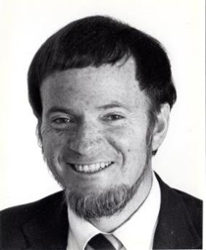

|

|
IN MEMORIAM
David Littlejohn
Professor, School of Journalism, Emeritus
UC Berkeley
1937-2015
David Littlejohn, a popular and prolific arts critic, author, former public television host, and a professor emeritus of journalism at the University of California, Berkeley, died peacefully, June 4, at his home in Kensington, California after a long physical decline. He was 78.
To the end, Prof. Littlejohn was writing and researching, listening to old recordings and preparing to review the upcoming San Francisco Opera season. “For me, writing is like breathing,” he once wrote. “When you stop it, you die.”
Prof. Littlejohn was a voracious reader and tireless researcher with an endlessly curious mind and wide-ranging interests, from classic cars to ocean liners and gothic cathedrals, from Verdi to “Burning Man,” from the Rolling Stones to the Ring Cycle, from the Silk Road to Route 66.
“I have been hopelessly eclectic since I was 13,” he once wrote, “when I simultaneously fell in love with classic country and opera: I saw Hank Williams live three times before he died, and chased Maria Callas around Europe during my semester off in ’57.”
Throughout his career, he wrote a sweeping array of books and novels, but regarded himself primarily as a critic and teacher. Among those titles are The Man Who Killed Mick Jagger (1977), Going to California (1981), Architect: The Life and Work of Charles W. Moore (1984), The Fate of the English Country House (1997 with his wife Shelia), and The Big One (2011).
He described his 35-year teaching career at U. C. Berkeley [1963-1998] as his “dream job,” where he taught undergraduate and graduate courses first in the English Department, then in the Graduate School of Journalism, which he helped guide toward widespread recognition as an elite program with Pulitzer Prize-winning alumni. Along the way, countless students called him the best teacher they ever had –- brilliant, engaging, wickedly funny, generous, compassionate and encouraging.
“Picture Dr. Johnson let loose on Las Vegas, Captain Beefheart taken to the opera, and you have some sense of the excitement David brought to North Gate Hall [U.C. School of Journalism],” said faculty colleague Tom Leonard.
In a parallel and symbiotic career, beginning with his earliest television programs for public television station KQED in San Francisco (1965-75), Prof. Littlejohn adopted the role of “critic at large.” This allowed him to broadly explore books, theatre, music, dance, art and architecture, with occasional forays into popular culture. The weekly, 10-year series was carried as a national PBS (then NET) series in 1971-72, where he reported on cultural events of consequence from all over the country, as well as London and Paris.
Soon after, he was hired as arts and culture critic for the Times of London [1975-89] and then the Wall Street Journal [1990-present]. It was a journey Mr. Littlejohn continued to enjoy. Los Angeles arts feature writer and critic Jim Farber described Prof. Littlejohn as a “critic’s critic” who “once humorously told me he became a critic so he could live like he was rich. He made us all richer in the process.”
Composer Jake Heggie said that when he worked at the San Francisco Opera, “we were all eager to read his reviews.” Mr. Littlejohn “took the time to listen to just about everything out there before writing....He had a driving curiosity to know more, to be completely informed. Every new experience represented an opportunity for surprise and delight.”
The fact that he was so ‘wide-ranging’ both in his intellect and extensive travels, was, in itself, a marvel, and a testament to what many saw was his greatest strength: his courage. In 1951, at the age of fourteen, he broke his neck in a diving accident in the California Sierras, and was left partly paralyzed. Although it would affect everything he would do, he refused to let the accident define his life.
“Virtually everything he did must have been difficult for him,” novelist, screenwriter and journalist Erik Tarloff said. But he shaped his disability into a “practical challenge rather than a personal tragedy. A perfect embodiment of the Greek definition of courage as grace under pressure.”
David Littlejohn’s many awards included a University of California Distinguished Teacher Award [1985], membership in Phi Beta Kappa and the Berkeley Fellows, and a Berkeley Citation [1997]—the university’s equivalent of an honorary degree. He also won a Fulbright lectureship to France, a special award from the American Institute of Architects, and grants from the Woodrow Wilson Foundation, the National Endowment for the Humanities, and the American Council of Learned Societies. From 1996-2009, he served as secretary for the Berkeley Arts Club, a monthly drinks-dinner-and-paper group founded in 1936 by artists and art lovers on the Berkeley faculty.
Prof. Littlejohn, whose great-great-grandfather emigrated to California from Vermont during the Gold Rush in 1850, was born in San Francisco in 1937. He attended Junipero Serra High School in San Mateo, and graduated from the University of California, Berkeley in 1959. It was during his college years, he later wrote, that “I discovered what an exciting, tolerant, worldly place Berkeley was, and I vowed to make it my home.”
He received his Ph.D. from Harvard in 1963, and within a month, married the former Sheila Hageman of London, who would remain the great love of his life. Over the years, the couple crisscrossed the Atlantic and ‘The Continent’ together, attended countless events and performances, and entertained friends at their garden home, with grace and panache. Sheila Littlejohn died in 2009.
Prof. Littlejohn is survived by his daughter, Victoria Littlejohn of Burbank, California, son, Gregory Littlejohn of Nevada City, California, as well as three grandchildren, a brother and three sisters.
Paul Zalis